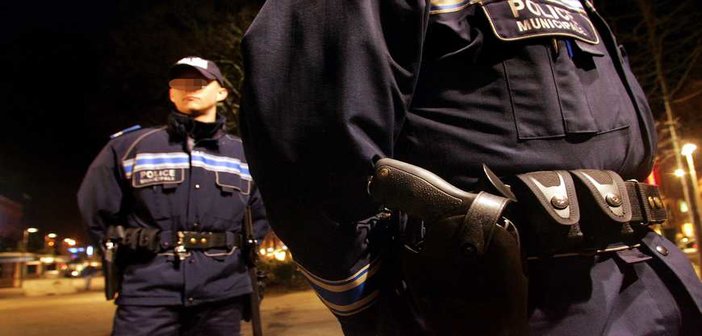The latest security-electoral craze from the City of Nice has been revealed. No, this time it is not about Roma people, the homeless, burkini-clad bathers, foreign flags, or overly loud weddings.
It concerns our children: a municipal police officer armed with a 9mm will be present in every primary school. Yes, you read that right. Uniforms and firearms, the “sanctuarized” republican school gives in to the post-attack security obsession.
Firearms in Primary Schools
Let’s be clear: we oppose the presence of firearms in primary schools, even on the belts of uniformed police officers, because a firearm always presents a danger.
On January 22, 2015, a soldier on duty in front of the Chabad Lubavitch center in Nice accidentally fired a burst of three bullets, which, fortunately, did not injure anyone. The burst was due to mishandling his weapon, then pointed toward the ground. Imagine if such an error were to occur again, but this time within a primary school…
Moreover, the presence of firearms may cause anxiety for young children. We must preserve schools as spaces of learning and knowledge transmission dedicated to childhood.
Schools must be protected from potential external threats but preserved from the fear of internal security pressure. Yes, securing school surroundings is essential, but we must also protect our children’s childhood.
And if we need to integrate the terrorist threat into civic education, it is up to teachers to decide when and how to talk to children about this danger, as they are trained and qualified for this.
Will municipal police officers assigned to schools receive training to properly respond to students’ inevitable questions?
Involving Parents and Citizens
In Nice, parents are barred from entering schools and can no longer enter educational establishments. They are thus deemed potential dangers.
Of course, while a terrorist might hide among parents, gathering parents unable to enter the school poses additional security concerns: the risk related to traffic and making parents and children easy targets in front of schools.
Our elected officials seem to overlook a simple yet obvious element: parents above all wish to protect their children. We will therefore be the first to react and report suspicious behavior or any endangerment of our children.
Why close schools to parents when they are their children’s primary security agents?
Citizens must be included in security policies and should no longer be excluded. Involving citizens is not limited to publishing a biased online questionnaire asking if they want municipal police to have the same powers as national police.
Involving residents doesn’t automatically mean citizen brigades replacing law enforcement: we need trained and competent professionals for this.
Citizen participation is one of the keys to successful security systems. Citizens must be co-decision-makers and active participants in local security policy, involved in every step of its development, implementation, and evaluation. We see this at every neighborhood committee where security issues persistently arise without formalization or significant effects. It is a matter of who shouts the loudest and pressures the local official present. We must implement a citizen evaluation of public policies, particularly security policies.
Posting an armed municipal officer in each primary school, as desired by the City of Nice, is a flawed idea. This measure once again highlights the lack of comprehensive thinking about security and the desire to keep citizens out of the most crucial decisions.
As we know, as the tragedy in Nice reminded us so painfully, security is everyone’s responsibility. Let us therefore allow everyone to participate.
by David Nakache, president of the association Tous Citoyens (All Citizens)


